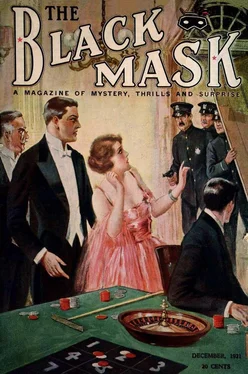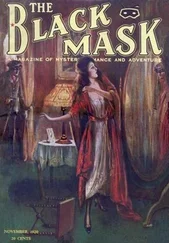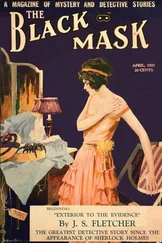Meredith Beyers - The Black Mask Magazine (Vol. 4, No. 3 — December 1921)
Здесь есть возможность читать онлайн «Meredith Beyers - The Black Mask Magazine (Vol. 4, No. 3 — December 1921)» весь текст электронной книги совершенно бесплатно (целиком полную версию без сокращений). В некоторых случаях можно слушать аудио, скачать через торрент в формате fb2 и присутствует краткое содержание. Город: New York, Год выпуска: 1921, Издательство: Pro-distributors Publishing Company, Жанр: Классический детектив, на английском языке. Описание произведения, (предисловие) а так же отзывы посетителей доступны на портале библиотеки ЛибКат.
- Название:The Black Mask Magazine (Vol. 4, No. 3 — December 1921)
- Автор:
- Издательство:Pro-distributors Publishing Company
- Жанр:
- Год:1921
- Город:New York
- ISBN:нет данных
- Рейтинг книги:3 / 5. Голосов: 1
-
Избранное:Добавить в избранное
- Отзывы:
-
Ваша оценка:
- 60
- 1
- 2
- 3
- 4
- 5
The Black Mask Magazine (Vol. 4, No. 3 — December 1921): краткое содержание, описание и аннотация
Предлагаем к чтению аннотацию, описание, краткое содержание или предисловие (зависит от того, что написал сам автор книги «The Black Mask Magazine (Vol. 4, No. 3 — December 1921)»). Если вы не нашли необходимую информацию о книге — напишите в комментариях, мы постараемся отыскать её.
The Black Mask Magazine (Vol. 4, No. 3 — December 1921) — читать онлайн бесплатно полную книгу (весь текст) целиком
Ниже представлен текст книги, разбитый по страницам. Система сохранения места последней прочитанной страницы, позволяет с удобством читать онлайн бесплатно книгу «The Black Mask Magazine (Vol. 4, No. 3 — December 1921)», без необходимости каждый раз заново искать на чём Вы остановились. Поставьте закладку, и сможете в любой момент перейти на страницу, на которой закончили чтение.
Интервал:
Закладка:
Why, there had been tears in his eyes when the verdict of his acquittal was read in court. Twice he had been seen faltering in his step as he came from the loft building in which the “Woodchucks” had their clubroom. He started at the slightest sound of anything like a pistol shot. And — worst of all — he refused to carry a gun.
That was the situation during two weeks following the old leader’s return. Then, on a Sunday morning, Terence Moriarity, bright-eyed, square of shoulder, spring in his step and a smile on his face, had gleefully pummeled two new members of the gang who accidentally blocked his path, hurled a bottle through a clubroom window and undisputedly resumed his sway.
The night before, as all of the world that mattered to him well knew, Jeff Hardy had screamed Moriarity’s name as he died and the old leader had automatically been crowned anew.
It did not matter so much to the “Woodchucks” how Hardy had died. That was a matter for the police to find out. The police did — to their own satisfaction at least — but Moriarity merely smiled at the sensation their theories caused. He still refused to carry a gun but he still led the “Woodchucks,” more feared and respected than he ever was and with confidence that his path of glory need not lead a man of intelligence again to the death house.
Jeff Hardy’s body had been found at the bottom of the elevator shaft in the old loft building in which his gang occupied a portion of an upper floor. Without doubt he had fallen or been hurled six stories to the concrete pit below. That he had not committed suicide was certain. There was no reason why he should in the first place and in the second place two reliable witnesses swore they had heard him cry “Damn you, Moriarity,” as he fell.
Moriarity had been arrested, of course, but released almost at once, because policemen as well as eminently respectable citizens had seen him a block away from the building at the same time that Hardy’s scream was heard by the night watchman and elevator man of the building.
It had taken some time to drag Hardy’s body from the pit and identify it. This caused a delay, but even at that the police admitted they probably would have been unable to make out a case against the old leader no matter how rapidly they worked.
Captain Bush, who knows probably as much about gangsters and gang politics as any police officer in the city, had ordered the arrest of Moriarity as soon as he heard of Hardy’s death. He did that even before he knew that the old leader was the last man seen with the new chieftain. He was also the one who recommended the discharge of the prisoner the next morning.
“There are more ways than one of killing a cat,” Captain Bush remarked philosophically to some of his newspaper friends, “and the law doesn’t keep up with all of them.”
“But you admit Hardy was alone when he fell down the elevator shaft,” persisted one of his questioners. “Why do you think he was killed?”
“He was killed as surely as Terence is again king of the Woodchucks,” replied the police veteran. “He was killed because Moriarity had lost his nerve. He was killed in the way he was because of the long nights Moriarity had spent in the death house, by a man who knew that if Hardy was killed by a shot he would walk through the little door instead of the big one on his second trip from his cell. He was killed by a man with brains and that imagination which had made him a tamed slayer.
“I know what happened as surely as I know I am sitting here, but there would be no use in going into court with it.
“Hardy had openly challenged the old leader’s authority. Everybody knows that. Even the boys on the street were mocking Moriarity. He had wept in court. He had been seen twice walking unsteadily out of the building, wiping his eyes with his handkerchief and seeming to be half blinded by tears. Once the elevator man had to help him to the street. Everybody in the district knew about it. He was in pitiful terror at the thought of the time when Hardy would pull a gun on him and challenge him to fight it out. He knew that when that time came he would either have to go back to the death house, be killed by Hardy or disappear. There wasn’t much choice. One was as bad as another for him. So, like the man of brains he is, he discarded all three of the obvious alternatives and found a fourth way out of the meeting he knew would have to come.
“It came last Saturday night. The two of them were alone in the club-room. Not a man in the gang would have dared to stick his nose inside the door. They knew there would be no question about who their leader was before morning and there wasn’t one of them within a mile of the place.
“The elevator man and the night watchman both heard them quarreling. They didn’t hear the words, but we don’t need them. Hardy taunted Moriarity to try to make him pull a gun. He had two — one his own and another for Moriarity in case he had none of his own. This second gun was loaded with blanks.
“There were two flasks in the room. One had gin in it and was still half full. The other was broken on the floor when Moriarity dropped it as Hardy pulled his gun and called upon him to fight.
“After dropping the flask, Moriarity walked out of the room and down the stairs, wiping the tears from his eyes as he had been seen doing twice before. The watchman saw him. The elevator man was on the top floor with his car. Moriarity had sent him there to put a new bolt on the roof scuttle. He swears the door at the club floor was closed when he went up — but elevator men always say that. Anyway the light was burning in the hall. That’s all he knows until he heard Hardy scream.”
“But how, then, did Moriarity kill him?” a reporter asked as the captain relighted his cigar.
“Ever hear of this new tear gas?” the policeman questioned. “That’s what was in the other flask.”
“But wouldn’t it blind Moriarity, too?”
“It did. But he had experimented until he could find his way out of the building in spite of it. The effect wears off in a few minutes and by the time he had reached the corner he was merely crying a few tears and had his alibi all made to order. Meanwhile Hardy was blundering about until he found the elevator door and fell to his death.
“An act of Providence, I suppose the law might call it, but it was really the act of a damned clever devil.”
The Finishing Touch
by Charles S. Wolfe
I
A hasty survey assured Ridgely that he was alone on the star-lit country road. With a sigh of satisfaction, he plunged swiftly into the brush which skirted the roadside. There he paused, alert, until his straining ears convinced him that his movements had been unobserved. Then he made himself comfortable for his brief vigil.
Crouching there, he reviewed minutely his actions so far, and his plans for what was to come. There was yet time, if he had erred, if there was a flaw, to withdraw quietly. It was merely a matter of waiting for another night. To be confronted with the damage wrought by an overlooked trifle when it was too late would be agonizing. And his very confidence disquieted him, made him feel that there was something amiss.
Yet he could find no weak link in his carefully forged chain. His left hand, dropping into his coat pocket, found the bottle of cyanide of potassium solution securely corked and ready to assume its role. His automatic weighed heavily in the other pocket, well oiled and loaded. The light mask which now covered the upper half of his face was really of no importance; just an extra precaution which discounted the possible, but highly improbable, intrusion of some pedestrian.
The cyanide, he felt sure, no one would be able to trace. Several weeks before he had stolen a couple of small lumps — quite enough for his purpose — from the private laboratory of a friend who rode the hobby of chemistry. Few people knew of the existence of the little attic laboratory; fewer still were aware of his acquaintance with its owner, and the man himself was ignorant of the fact that his supply had been levied on.
Читать дальшеИнтервал:
Закладка:
Похожие книги на «The Black Mask Magazine (Vol. 4, No. 3 — December 1921)»
Представляем Вашему вниманию похожие книги на «The Black Mask Magazine (Vol. 4, No. 3 — December 1921)» списком для выбора. Мы отобрали схожую по названию и смыслу литературу в надежде предоставить читателям больше вариантов отыскать новые, интересные, ещё непрочитанные произведения.
Обсуждение, отзывы о книге «The Black Mask Magazine (Vol. 4, No. 3 — December 1921)» и просто собственные мнения читателей. Оставьте ваши комментарии, напишите, что Вы думаете о произведении, его смысле или главных героях. Укажите что конкретно понравилось, а что нет, и почему Вы так считаете.












